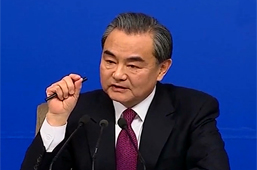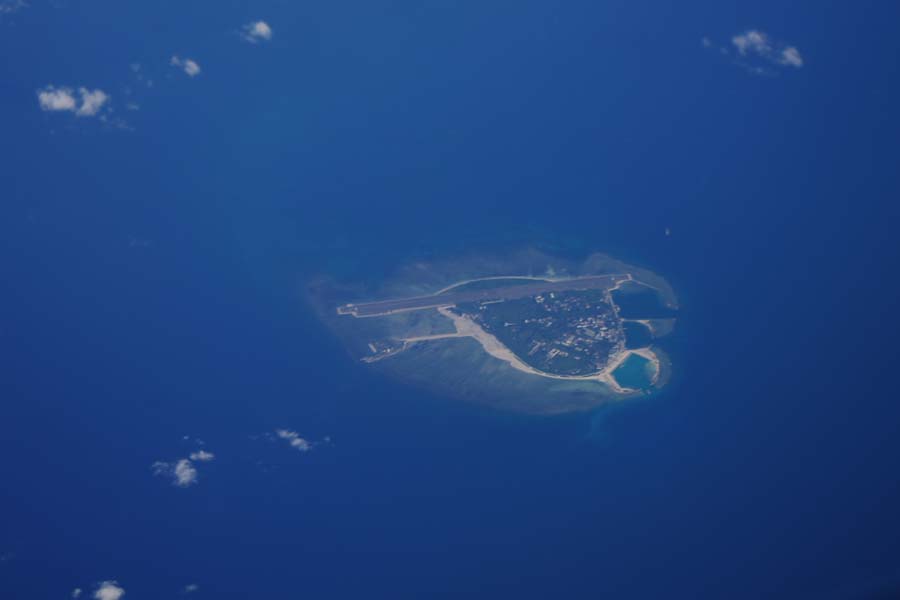The recent collision of the USS Connecticut, a Seawolf-class nuclear attack submarine of the U.S., with an unknown object in the South China Sea has triggered broad attention from the international society. Both the incident itself and the irresponsible handling of the U.S. that followed clearly showed that the U.S. is the biggest threat to regional security and stability.
According to the U.S. side, the collision took place on Oct. 2. However, the U.S. didn't send out any information about it until five days later, and what it said was short and vague. It's been over 20 days since the incident happened, and the U.S. is still keeping quiet about the details..
What was the USS Connecticut up to do secretively in the South China Sea this time? What exactly did the submarine hit? Why did that collision happen? Did it cause a nuclear leak and bring nuclear pollution to the environment? Facing the reasonable concerns of the international society, especially the countries in the region, the U.S., which has always bragged about its "transparency" and "international responsibilities," is keeping its mouth shut about the matter.
Just imagine, will the U.S. still be acting low-key, in such an unusual manner, if similar incident happens near the U.S.? There must be something fishy about such unusualness. Given the suspicions of the U.S., all parties relevant have to doubt what indeed happened and what Washington planned to do.
The USS Connecticut is a Seawolf-class nuclear attack submarine. The incident this time gave a clearer image of the potential risks of nuclear leakage and pollution brought by U.S. nuclear submarines. It needs to be pointed out that the U.S. has a bad security record in its nuclear submarine operations, and its nuclear activities have caused damages to the international security and ecology.
Apart from that, the country is addicted to the export of nuclear equipment. The U.S. and the U.K. have recently decided to carry out nuclear submarine trade with Australia, a non-nuclear state, which triggered broad criticism from the international society.
The nuclear submarines of the two countries use weapon-grade high-enriched uranium (HEU) up to 90 percent purity. To export such nuclear submarines to Australia means a transfer of massive highly sensitive nuclear materials and technologies, which will definitely create a risk of nuclear proliferation and possibly trigger an arms race.
For years, the U.S., in the name of non-proliferation, has oppressed and even posed sanctions against other countries around the world that carried out HEU activities. However, it is exporting HEU to Australia today. Such double standard proves that the U.S. is indeed the largest source of risks of international nuclear security.
The South China Sea is stable, and should not become a place where the U.S. seeks private geopolitical profits. The frequent and large-scale provocation of the U.S. military vessels and aircraft in the South China Sea has threatened the sovereignty security of China and other regional countries, and was the fundamental reason that caused the collision this time.
This year has witnessed an increasing intensity of U.S. reconnaissance near China. As of the end of July, the U.S. military had conducted close-in reconnaissance in the air and sea for nearly 2,000 times targeting China.
As a country outside the South China Sea, the U.S. has long taken the issue of the South China Sea as a tool to alienate regional countries from each other and oppress China, trying to label China with the so-called "breaking rules" and "militarization in the South China Sea." However, facts have proven again and again that the U.S. is the biggest promoter of militarization in the region, as well as the largest source of risks to regional security.
The collision of the USS Connecticut in the South China Sea was not merely a technical accident, but a serious incident threatening regional stability. The U.S. must act responsibly, release the basic information of the accident and its possible consequences to regional countries, and respond to the concerns of the international society.
What's more important is that the U.S. needs to have introspection on its role in the South China Sea. If it is still addicted to the Cold War thinking, and tries to maintain its so-called hegemony by military pressure and alienating regional countries, it will always be the biggest destroyer of regional security, and will be opposed by the forces of peace and justice around the globe.
(Zhong Sheng is a pen name often used by People's Daily to express its views on foreign policy and international affairs.)















